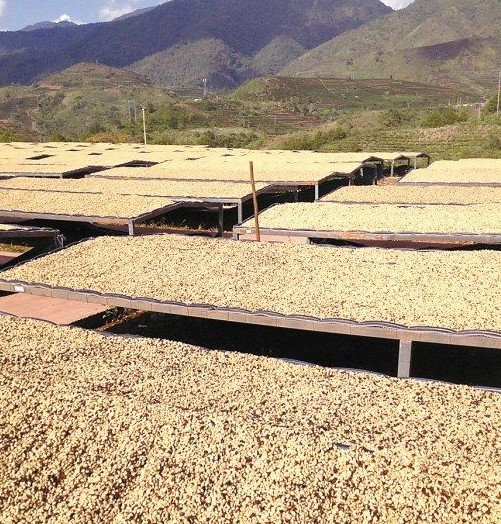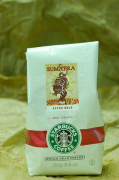China Coffee Market Yunnan Coffee Wants to Fight for Pricing Power
From 390000 mu five years ago to 1.3 million mu in 2012, the rapidly expanding Yunnan coffee planting industry suffered a cold spell in the market last year. First, at the beginning of last year, the international giant Nestl é announced that it would stop its acquisition and triggered a "unsalable storm" that triggered a panic sell-off among Cannons. At the end of last year, the purchase price of coffee beans fell to a five-year low, approaching the planting cost line. The investigation in Yunnan found that under many challenges, Yunnan coffee is brewing a counterattack storm.
The purchase price falls close to the cost line and farmers wait and see.
At present, Yunnan Province, where raw bean cultivation accounts for more than 98% of the domestic industry, is ushering in the coffee harvest season. But the farmers are not happy at all.
The person in charge of the Dalinwo coffee Cooperative in Pu'er City told us that the company currently has an acreage of nearly 500mu, and the prices offered by the main buyers Nestl é and Starbucks are low, and Ka Nong is still waiting. At present, the prices of pesticides and chemical fertilizers continue to rise, and the cost of planting is already close to 16 yuan / kg. If prices continue to fall, farmers may choose another way out. In Ximeng County, Pu'er City, a village cadre told reporters that due to the rising coffee market in recent years, nearly 200 mu of fields in the village were converted into coffee five years ago, and last year was the second year that coffee trees began to bear fruit.
Hu Lu, deputy secretary-general of Yunnan Coffee Industry Association, said that the current planting cost of leased land is about 15-16 yuan / kg, and if it falls below this price, it will deal a serious blow to Yunnan's coffee industry.
Yunnan coffee wants to counterattack and fight for pricing power
The reporter found that the current pricing of Nestl é is based on the latest New York coffee futures prices, and reduced by a few cents, scattered farmers do not have the right to speak.
"the price refers to the price of ordinary coffee beans on the coffee Exchange of New York, which is very unfair to us." Peng Yuanguo, vice mayor of Pu'er City, said in an exclusive interview a few days ago that Pu'er City is currently committed to building a local coffee brand and plans to support a number of large enterprises with pricing power to form a whole industry chain. It also plans to formulate industrial technical regulations and standards, apply for the protection of origin, and strive to regain the international pricing power.
Coffee, the largest local curry company, used to be Nestl é's largest supplier of raw materials in China. In recent years, it has begun to set up its own door, taking the road of deep processing and industrial chain to build its own brand. Xiong Xiangjin, chairman of the board, said that if the purchase price of international buyers falls below the cost price, it will start the purchase and storage of protective prices to help farmers tide over the difficulties.
The giant coffee changed its strategy and responded.
In the face of the challenges of local partners, some "foreign teachers" have begun to change the original simple procurement strategy and strengthen cooperation with local enterprises. Starbucks revealed that it introduced four new coffee varieties for adaptability test three years ago, and after the five-year trial period expires, it will plant these four coffee varieties on a large scale, when its first coffee planting base in the world will be located in Yunnan, and its first Asian coffee grower support center in Pu'er has been put into operation recently.
In fact, Starbucks is already changing its strategy in the face of the rise of local enterprises in Yunnan. Its joint venture with Aiyi Group, the largest local coffee company in Pu'er, was officially put into operation in December last year, and its coffee primary processing plant has an annual capacity of 20, 000 tons of raw beans.
The coffee beans of Aichi coffee, a leading coffee company in Pu'er City, are drying outdoors.

Important Notice :
前街咖啡 FrontStreet Coffee has moved to new addredd:
FrontStreet Coffee Address: 315,Donghua East Road,GuangZhou
Tel:020 38364473
- Prev

Development of China's Coffee Industry Starbucks and Yunnan Coffee
With its unique climatic conditions and soil environment, Yunnan has become one of the best coffee producing areas in the world, attracting the attention of many famous coffee enterprises in the world. By promoting the Yunnan coffee project, Starbucks has launched a series of measures ranging from coffee planting, primary processing to store operation in Yunnan. In 2007, Starbucks purchased coffee from Yunnan. In 2009, Starbucks launched the Phoenix.
- Next

Introduction to the Development of Chinese Fine Coffee and Coffee in Taiwan
Formosa is a good impression that Taiwan has brought to the world! In this green island with an area of only 36193 square kilometers, the vibrant coffee multiculturalism continues to bloom here, giving Taiwan an important place not only in Asia, but also in the coffee field of the world. Taiwan, known as the beacon of democracy in Asia and the world, the coffee industry, like this, leads ships.
Related
- The ceremony is full! Starbucks starts to cut the ribbon at a complimentary coffee station?!
- A whole Michelin meal?! Lucky launches the new "Small Butter Apple Crispy Latte"
- Three tips for adjusting espresso on rainy days! Quickly find the right water temperature, powder, and grinding ratio for espresso!
- How much hot water does it take to brew hanging ear coffee? How does it taste best? Can hot water from the water dispenser be used to make ear drip coffee?
- What grade does Jamaica Blue Mountain No. 1 coffee belong to and how to drink it better? What is the highest grade of Blue Mountain coffee for coffee aristocrats?
- What are the flavor characteristics of the world-famous coffee Blue Mountain No. 1 Golden Mantelin? What are the characteristics of deep-roasted bitter coffee?
- Can I make coffee a second time in an Italian hand-brewed mocha pot? Why can't coffee be brewed several times like tea leaves?
- Hand-brewed coffee flows with a knife and a tornado. How to brew it? What is the proportion of grinding water and water temperature divided into?
- What is the difference between Indonesian Sumatra Mantinin coffee and gold Mantinin? How to distinguish between real and fake golden Mantelin coffee?
- What does bypass mean in coffee? Why can hand-brewed coffee and water make it better?

